Egypt Tourist Scams You Need to Know: Our Real Experiences in Giza & Cairo
- Jenn & Leon

- 5 days ago
- 16 min read
Egypt is one of those destinations you dream about for years. The pyramids, the Nile, the ancient ruins, it’s the kind of place that stirs the imagination.
But no one warns you how intense it can feel when you’re actually there.
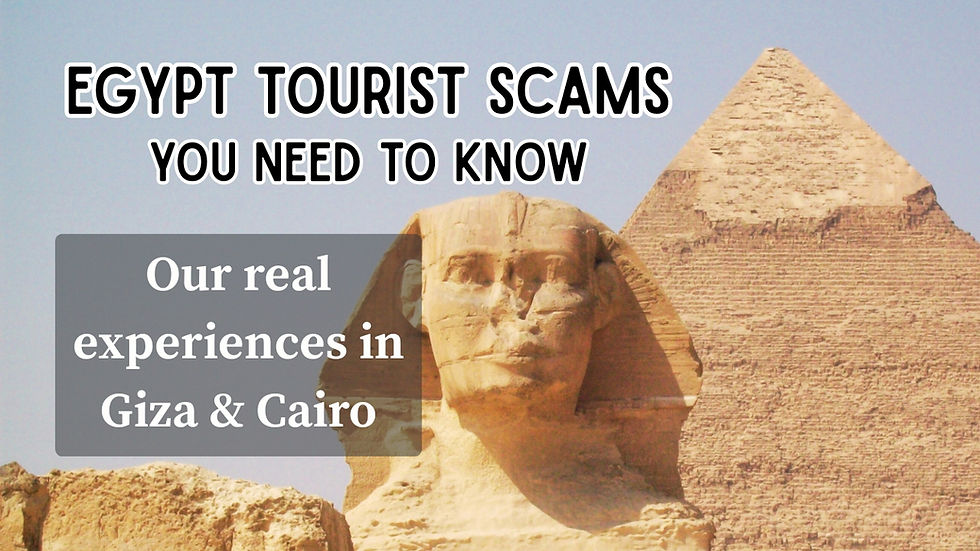
One minute you’re standing in front of one of the world’s greatest wonders, the next you’re being followed by someone who just kindly offered to wrap your scarf and now wants money for it.
It’s overwhelming, confusing, and honestly, sometimes infuriating. It is not just a hustle; it is major-league scamming too.
We’re full-time travelers who’ve been to 42 countries, and Egypt hits differently.
After a smooth first trip to the protected, polished resort town of El Gouna, we returned to experience “the real Egypt” in Cairo and Giza. And wow… did we ever.
From fake hotel bookings to overpriced tours, shady dinner cruises, and relentless street scams, we saw a side of Egypt we weren’t prepared for, and we don’t want you to go in blind.
In this post, we’re sharing our real experiences with tourist scams in Egypt, especially in Giza and Cairo, so you know what to expect, what to avoid, and how to protect yourself.
Whether you’re booking a hotel, hailing an Uber, or simply walking the streets, here’s what you need to know before you go.

Travel Resources
Introduction

After visiting El Gouna in Hurghada in 2022, we were keen to return to explore more of the incredible country of Egypt.
We had a taste of the beautiful food, enjoyed the famous waters of the Red Sea, drove ATVs through the desert, and even took a day tour to Luxor and the epic Karnak Temple.
That was a very long day, but totally worth it.
It’s fair to say that our first experience in Egypt was fairly sheltered. El Gouna is a luxury man-made city surrounded by walls, with a heavily guarded main entrance.
Only tourists and workers are allowed inside.
When we left the city for our Luxor tour, we had a private car with a guide who took care of everything and shielded us from the usual hustle.
We were genuinely well looked after.
This time, things were different.

In terms of scams, we’ve encountered it all since returning, from aggressive street begging to a full-on hotel bait-and-switch.
We’re sharing it all below so you know exactly what to watch out for.

What Kind of Scams Happen in Egypt?
Egypt is packed with iconic history, but travel here is far from smooth.
From the moment you arrive in Cairo or Giza, you'll likely be targeted for scams. Sometimes they are subtle, sometimes bold.
This isn’t fearmongering, just facts based on real experiences.
Here’s a quick breakdown of what we encountered and what you might face:
Fake hotel bookings through reputable-looking platforms
Overpriced and misleading “VIP” tours are sold at hotels
Constant tipping pressure, often disguised as hospitality
Money swaps and fake bill tricks during payments
Uber scams where drivers cancel and demand inflated cash fares
People offering help, then demanding a tip
Shops pushing fake souvenirs, “gifts,” and aggressive upselling
People posing as police or official guides to gain your trust
Being followed after visiting “secret” or “hidden” areas
We’re not saying don’t go. We’re saying go informed.
The Agoda Hotel Scam – Our Worst Booking Experience Ever
This was hands down the worst accommodation experience we’ve had in 42 countries.
We booked a hotel in Giza through Agoda. It was confirmed. They sent a message offering airport pickup (for USD 15, despite the listing stating it was free).
So far, so good (we thought).

We landed at 2 am, and we were indeed greeted by someone with our name on a card as we got out of arrivals. However, unbeknownst to us, we were driven to a completely different hotel.
At first, we suspected it was not quite right, but wondered if maybe we were just in a different part of the hotel.
It turns out that this was not only not the hotel we booked, but also a different price, location, and using the name of the hotel we did book.
They charged us 170 USD on the spot. We knew something was up, but tired, weary, and looking forward to a shower and bed, we paid. Either that or the street, right?

We then took our luggage to our room, which was ok. Certainly not the photos we had seen, though, not even close.
We then went up to the roof, where we found our view of the pyramids of Giza obstructed by another building. Again, not what we had seen.
Part of why we booked the hotel we did was for an unobstructed view.
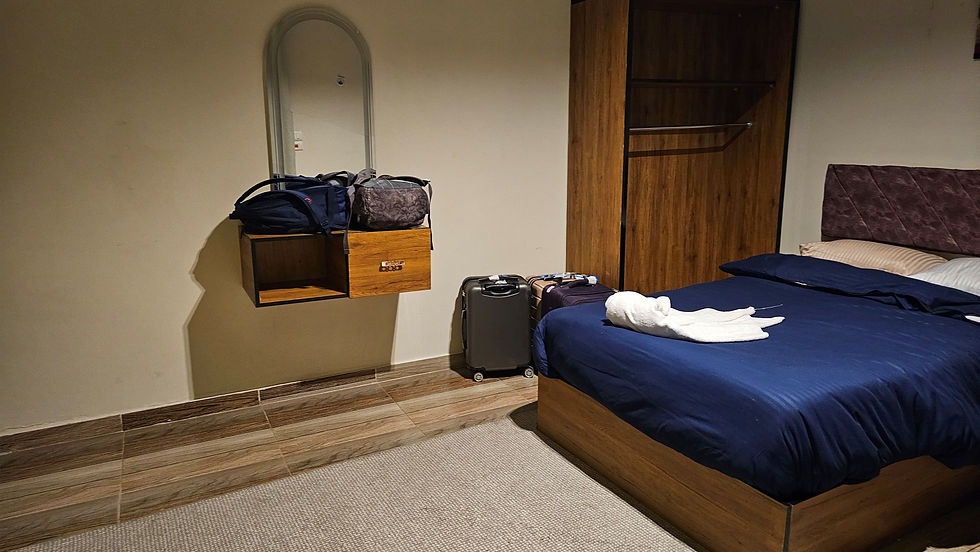
We decided to question it there and then; however, the staff insisted it was the right place and blamed Agoda.
Then they claimed they got our reservation from Booking.com (which we never used).
They totally denied everything, even making out that they did not know the name of the other hotel, which is literally a 5-minute walk away.
We later found out that the hotel we booked was the first in the area, so you would think they would have heard of it.
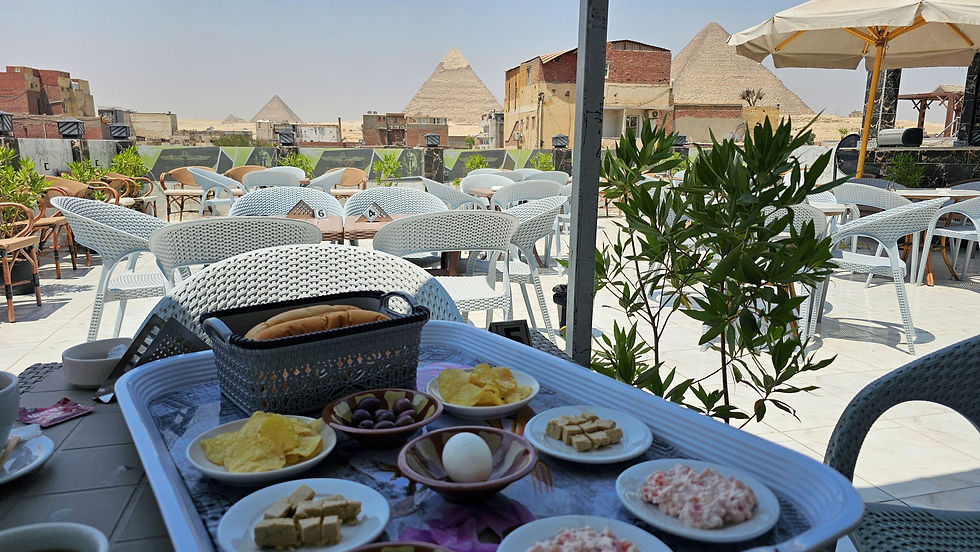
The next day, we found the hotel we actually booked. We went to the rooftop for breakfast, and when we finished, we told the staff (who were hovering around us the whole time) that we were going to our room.
We were told the manager was coming at midday. So we planned to wait until then to at least find out what could be done.
While part of us were resigned to just staying here, a larger part was frustrated at being wronged.
So we decided to take action, and Leon was able to sneak out and walk to the hotel we had booked. When he got there, they were super helpful. That being said, funnily enough, they had no record of our booking.

After showing the evidence of the booking on his phone, Leon then double-checked the room and rooftop, confirming the hotel as correct. They then kindly provided a driver to get him back to Jenn, who was waiting intently for communication on WhatsApp.
On return to the wrong hotel, sure enough, the concierge and someone who looked more official were waiting in the stairwell. And they were shocked when Leon turned up.
He told them that we had sorted the situation and just wanted to get our luggage and go. We had a car waiting.
Almost barring Leon from entry, they were insisting we stay there, and that the other hotel couldn't know about our booking. It was a white lie that they did, but at this point, it was time for us to start taking control.

After Leon managed a sly message to Jenn, who had already heard the commotion, she brought our bags to the door behind the staff and demanded that they allow us to leave.
At this point, their stance softened, and they briefly offered a tour in exchange for the money we paid, and we said we would let them know. We mooted a refund, which they danced around quite well.
We made it out, and thankfully, our driver was still outside and got us to our correct hotel.
The original hotel had no reservation from us. But they accommodated the situation, and we found them to be super kind and helpful.
We were both stressed and deeply frustrated that our excitement about being here was being dampened by all of this. And of course, having to pay again for our correct hotel.
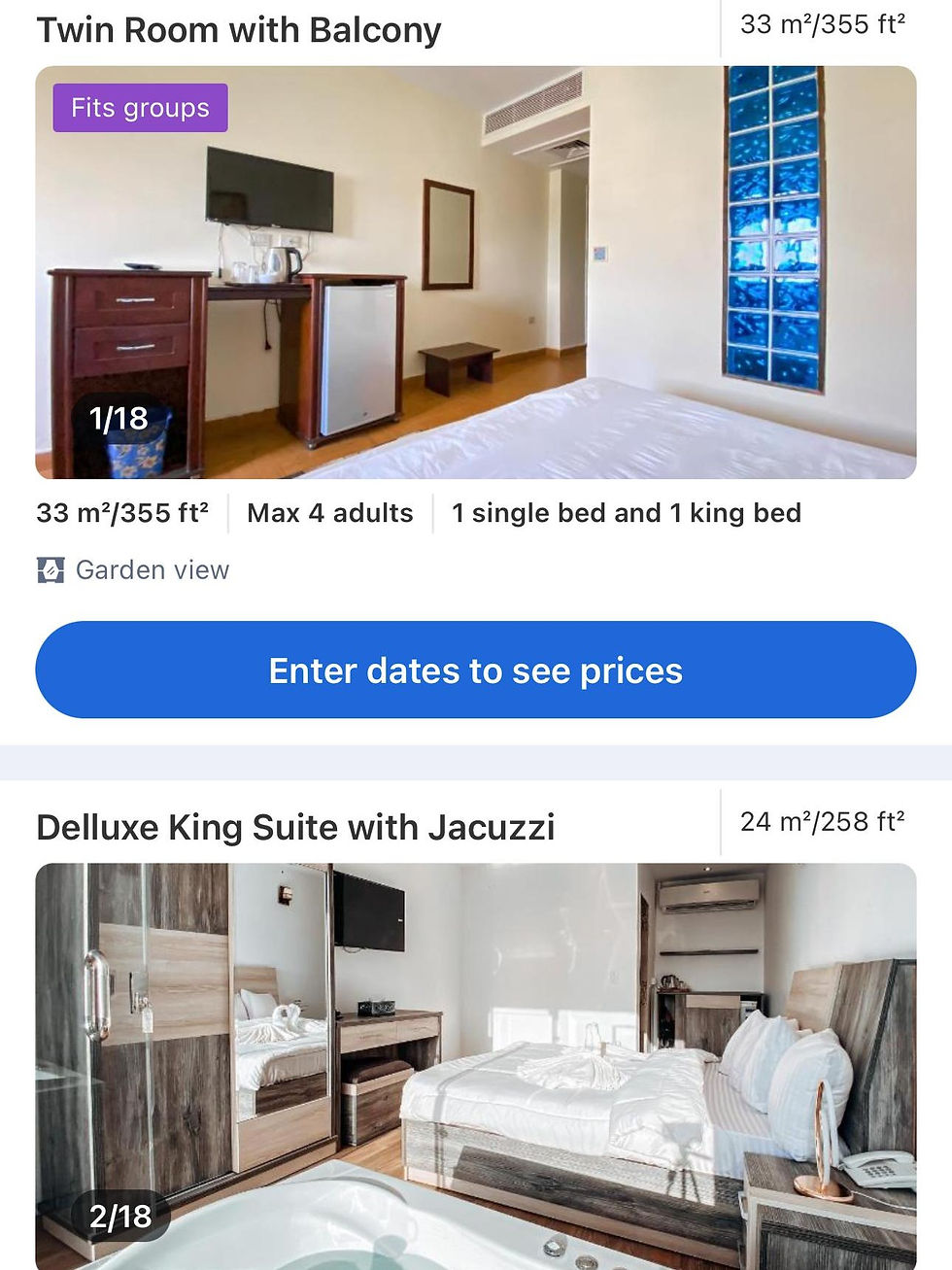
A few days later, Leon went back to the scam hotel, asking for a refund. For over 2 hours, they insisted it was impossible, as we had to cancel the booking on booking.com, which we proved there was no way we could do, as we booked on Agoda.
Eventually, they agreed to pay us cash, after deducting 2 nights as we 'checked out' at 1 pm (shocking!). They also deducted their commission (also shocking), and a card ATM fee (what?!).
We settled on 53 USD in the end, meaning this whole debacle had cost us over 100 dollars. The way we see it, that is their karma.
Agoda's support was useless, and we lost money to a scam coordinated between the wrong hotel and the booking platforms.
Our advice? Never use Agoda (in Egypt anyway). If it can happen to full-time travelers, it can happen to anyone.

Overpriced Tours & Misleading Promises from Hotels

We purchased a USD 350 “VIP tour” through our now correct hotel.
The itinerary sounded impressive: a horse carriage ride around the Pyramids, entry to the Egyptian Museum, visits to a mosque and church, a buggy ride in the desert, and a trip to Saqqara.
What we actually got was a patchwork of uncoordinated drivers, sketchy ATVs, and upselling at every turn.

On the first day, no one knew about our pyramids ride.
A random horse carriage driver was pulled in off the street, and he spent the whole journey begging us not to tell the hotel; he said he wasn’t paid and pleaded for a tip.
We gave him 30 USD, feeling sorry for him, not realising this was going to become a common theme amongst those supposedly working for/with the hotel.
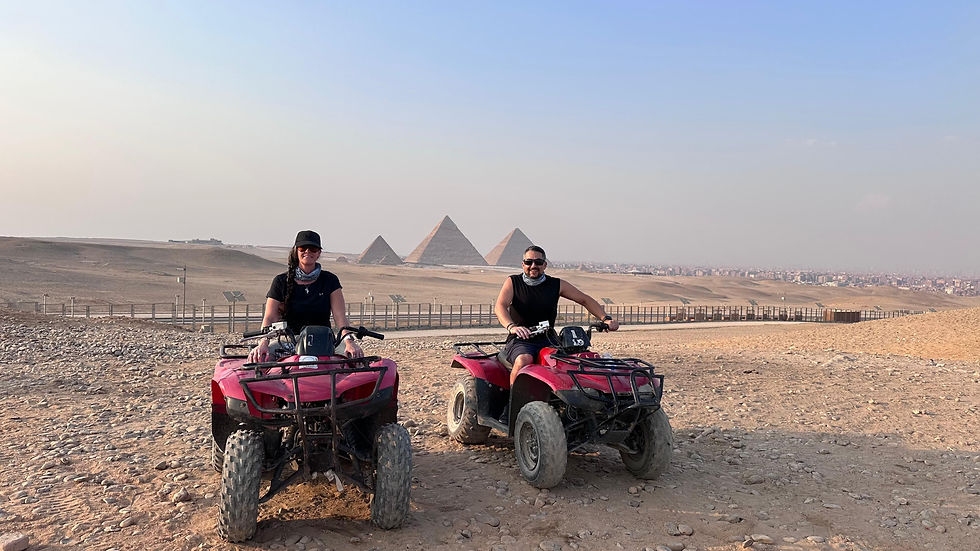
The ATV arrived later that day, and it wasn’t the buggy they described. It had no top, no helmets, and it needed a tire change halfway through.
We did enjoy the desert views, but it lasted only 20 minutes, and we didn’t get to see the full sunset.
Jenn didn’t feel safe riding it, and again, the driver asked for extra money, showing us photos of 'his' decrepit home.

The second day was better. Our guide, George, was great, and we genuinely enjoyed visiting Saqqara and the other cultural sites (Djoser Pyramids, St George's Church, Mahamad Ali Mosque).
But even then, we had to pay for all entrance tickets, fend off hawkers, and deal with non-stop tipping expectations.

Lunch was included both days. It was delicious koshari, but we later found out it cost less than a dollar locally.
Yet again, we were overcharged heavily. Yet again, we were given poor value for money.
To the hotel’s credit, they did try to make amends after we complained. They upgraded us to their best room, gave us lots of free drinks and food, and offered a free Nile dinner cruise.
Unfortunately, though, even that came with its own issues.

The Scammy Nile Dinner Cruise
The cruise was pitched as a romantic evening with river views, dinner, and live entertainment.
What we got was a buffet meal in a packed dining room with barely any view of the Nile.

Entertainment was short; singers and dancers performed for a few minutes.
Then, the same entertainers circled every table with a photographer pushing overpriced photos onto every guest.
No option to decline politely; they hovered, waited, and made it a little awkward.
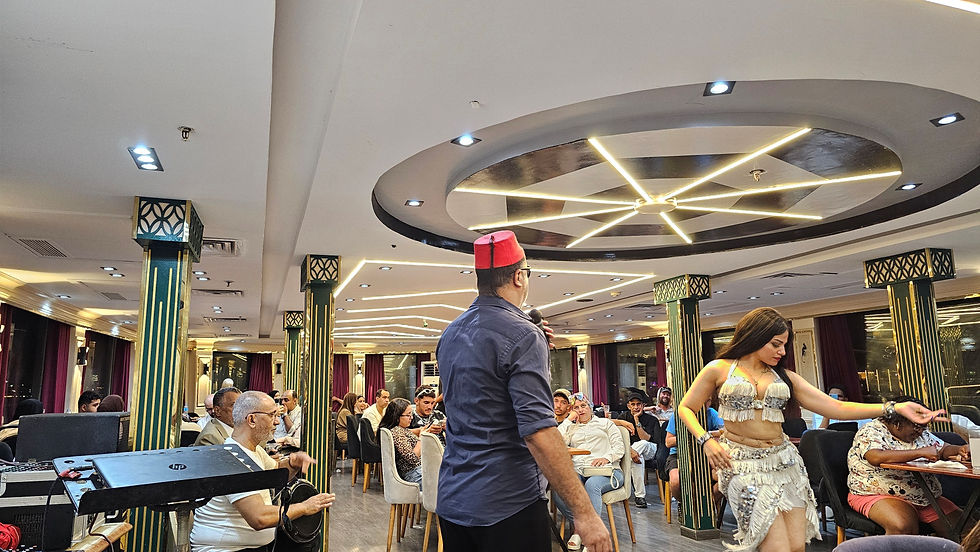
To top it off, our drinks came to $13. We handed a crisp $50 and $5. The server returned with a crumpled $50, claiming it was fake.
We knew it wasn’t.
We marched up to the counter, demanded to see the manager, and called them out for trying to scam us.
They tried to push card payment, adding a “5% service fee.” We refused.
Eventually, they gave us our change (after George came over), but even that included a ripped $20 note. We made them swap that, too.
It felt like being played from start to finish. We thought it was weird at first that our driver joined us on the cruise, sitting at our table, even.
But very thankful in the end, as he helped avoid yet another scam.
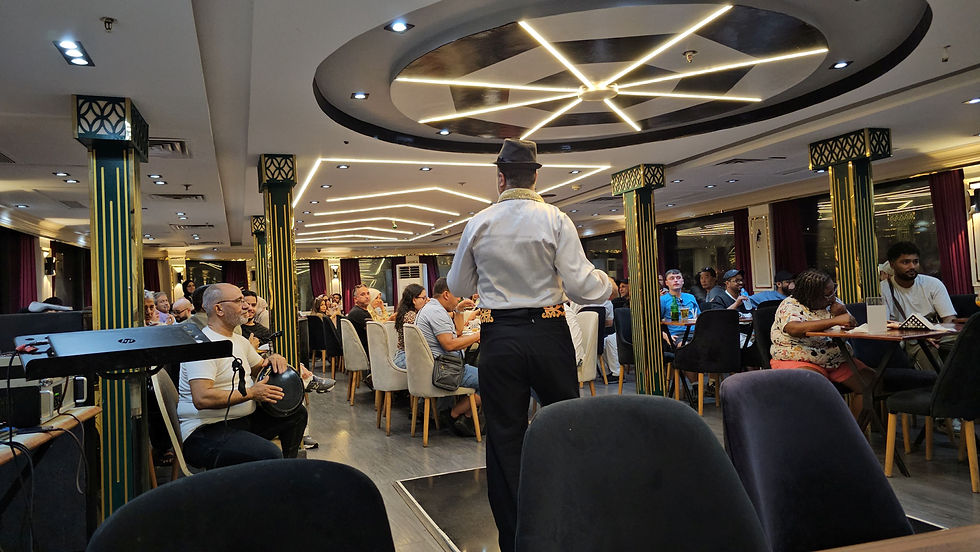
Giza & Cairo Street Scams – A Constant Battle
Giza is one of the world’s most iconic destinations, but walking its streets can be overwhelming.
You can’t take ten steps without someone approaching. The intro is always the same: “Where are you from?” or “Welcome to Egypt!”
It might seem friendly, but it always ends in a sales pitch, for a ride, a tour, a shop, or most commonly, a tip.
Jenn brought her own scarf to visit the Mohammad Ali mosque. A man offered to help wrap it, then immediately asked for money.
At Saqqara, someone offered to show us a “hidden area”, which we declined, and then followed us around the whole pyramid, demanding payment.
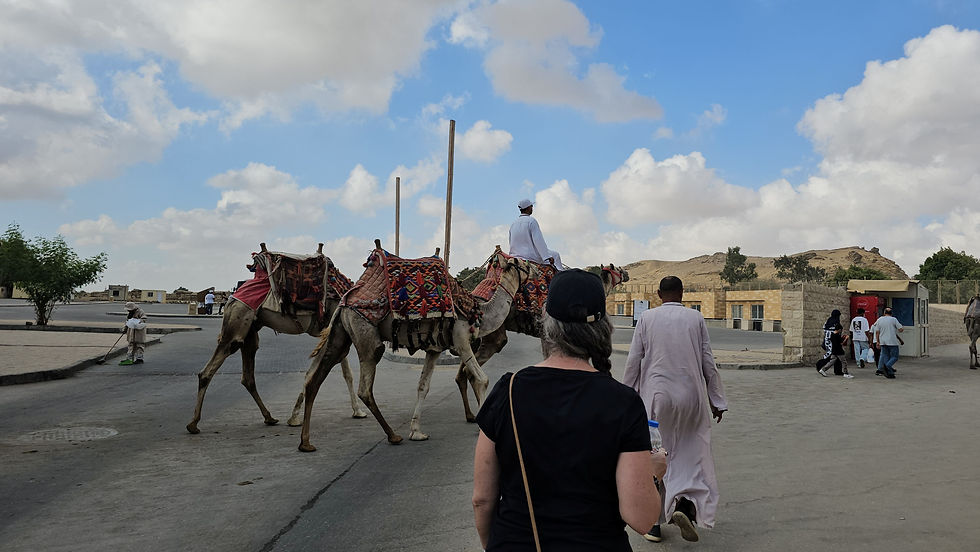
Prices change constantly. A drink might be 50 EGP one day, and 100 the next.
We were offered a ride to Alexandria for 5000 EGP, and when we said no, the price dropped to 3500. Online? It was 1500. One frustrating pattern we noticed was that some restaurants and small stores don’t display prices at all. This leaves tourists wide open to price gouging.
The same item could be double what a local pays, depending on the day, your appearance, or whether you ask first. If prices aren’t shown, ask upfront, and be prepared to walk away.
We’ve tried to help where we can. We’ve bought extra meals to give to people on the streets. But the pushing never stops. And kindness is rarely just kindness.

The Reality Behind Giza’s Poverty
Giza is the gateway to one of the greatest wonders of the ancient world. But step outside the pyramid complex, and you’ll see a different reality.
The poverty here is undeniable. Streets are often covered in litter. Buildings look half-finished. Roads are in bad shape.

There is animal muck and garbage everywhere. Bad smells waft and linger. And people are desperate.
The disparity between ancient grandeur and modern poverty is jarring.
Tourism is vital to Egypt’s economy, but not everyone benefits. This gap creates a non-stop hustle, where every tourist is an opportunity.

Many locals are simply trying to survive, but the tactics used can feel aggressive and exhausting.
Hotel entrances, ATM's and restaurants are magnets for hawkers and well-trained kids asking for money and food.
After a few hours, it feels like you just want to go home. Back in the hotel, it is hard to leave.
It’s a tough cycle. And as a tourist, you’ll feel it every day.

Scams to Watch Out For – Real Examples from the Street
Here are some of the most common scams in Egypt, based on what we experienced and what fellow travelers told us:
⪢ Fake Guides & Impersonators
People pretending to be police, guards, or site officials will offer you facts or directions, then demand money. Sometimes they claim to be mandatory guides. They’re not.
⪢ Fake Ticket Sellers Dressed as Staff
Outside many major attractions like the Egyptian Museum or the Pyramids, you may find people in uniform-style clothing offering to sell tickets.
Some even wear lanyards to look official. Always buy your tickets directly from the designated ticket booth.
We heard multiple stories of tourists being scammed with fake entry tickets that either weren’t valid or didn’t include full access.
⪢ Papyrus, Perfume & Souvenir Shops
Many shops near major attractions lure you in with “gifts” or free demonstrations.
Prices often start low, then escalate quickly. We were advised by locals not to buy from these shops, and we agree.
⪢ The “Helpful Local” Trick
Someone offers directions or help with your scarf or camera, only to follow it with a demand for money. Even a simple “hello” can be a sales pitch.
⪢ Uber Cancellations & Cash Demands
One scam that didn’t happen to us directly, but did happen to another guest we spoke with: A driver accepts your Uber ride, turns up, cancels it on the app, and demands cash, often at an inflated price. If you say no, they refuse the ride.
⪢ Money Handling & Counterfeit Notes
Be extremely careful when paying with large notes. Several places tried to switch our bills and claim they were fake.
Always hand over cash in plain sight and insist on change immediately.

How to Avoid Scams in Egypt
There’s no foolproof way to avoid every scam, but being aware and assertive helps a lot.
Here’s what worked for us:
Don’t use Agoda. Always confirm bookings directly with the hotel.
Use Uber or in-app transport, but confirm the license plate and name before getting in.
Book tours with reputable operators, not via random hotel staff.
Don’t engage with anyone offering something for “free.”
Keep small change handy to avoid giving large bills.
Be direct. Don’t be afraid to say “no” and walk away.
If something feels off, trust your instincts.
Not Everything Is a Scam – Sometimes It’s Just Survival
It’s important to say this: not everything in Egypt is a scam. Sometimes what feels like pushiness is just people hustling the only way they know how.
Yes, Giza is intense. And yes, Cairo can feel overwhelming. You’ll be told to watch your wallet, ignore street vendors, and walk fast with your head down.
We get it, and we’ve done that too. But here’s the thing: Giza in particular requires a bit of a mindset shift.
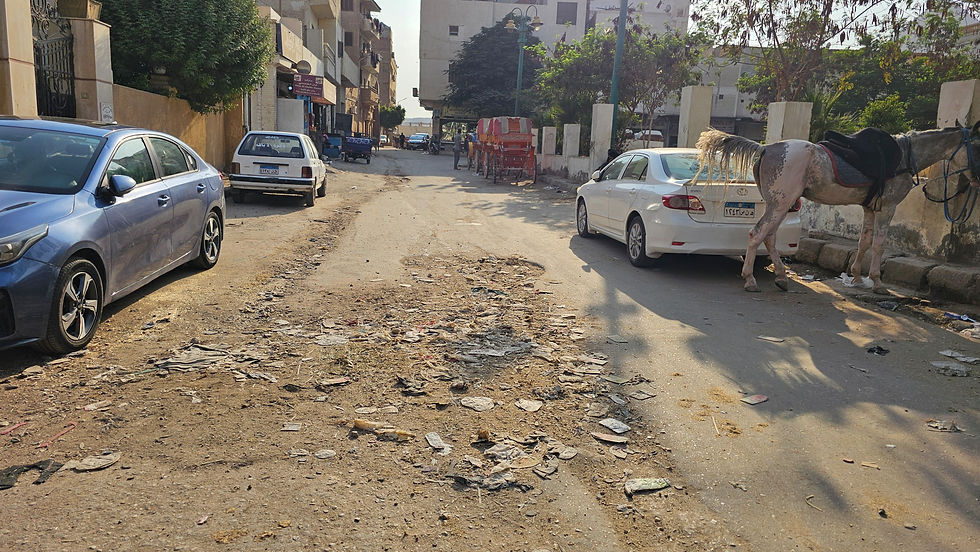
If you're coming from places like Europe, Canada, or the U.S., chances are you’re used to tipping 10–20% without thinking twice.
That’s 5, 10, sometimes 20 USD or more for a meal or a cab ride. In Egypt, a tip of 300 EGP is barely 5 USD, but to someone on the street here, that can make a real difference.
We’re not saying you should hand out money left and right or treat yourself like a walking ATM. But if you’re planning a trip here, it’s worth setting aside a small tip budget.
Something like 10 – 15 USD a day is more than enough, and it goes a long way.
Tip your hotel staff. Tip your driver. Tip your waiter. They’re likely underpaid (or often not at all) and genuinely trying to make your experience better.
That being said, be very careful when you pull out your wallet in public. The moment money becomes visible, expect attention, and sometimes a lot of it.
We’ve had people surround us within seconds. As many Egyptians joke, “they can smell dollars from a mile away.” Be generous, but also be smart.
What to Say & Do to Deflect Scammers
Simple, firm replies work best. Avoid eye contact and don’t get drawn into friendly small talk.
Here are phrases we’ve used that helped:
“No, thank you.”
“I have a guide.”
“I’m not interested.”
“No photos.”
“No shopping today.”
Or, answer in another language, like Spanish or French... it works!
Avoid shaking hands, accepting offers to help, or looking like you’re unsure of where you’re going.
What Not to Do in Egypt as a Tourist
To avoid becoming a target:
Don’t flash your wallet, phone, or camera.
Don’t accept help from strangers unless it's a clear emergency.
Don’t assume kindness is free; in many cases, it isn’t.
Don’t walk into shops “just to look.”
Don’t agree to vague “VIP” or “custom” tour offers.
Don’t hand over your phone, passport, or large amounts of cash to anyone.
Egypt Travel Scams FAQ – What You Really Need to Know
Is Egypt dangerous for tourists?
Not in terms of violence, but the pressure, scams, and intensity of street interactions can be mentally exhausting. You need to be firm and constantly alert.
What should I do if I get scammed?
If possible, speak directly to a manager or authority figure on-site. If you booked online, file a complaint with screenshots and full detail.
But be realistic, and know that getting a refund isn’t always possible.
Can I still use platforms like Booking.com or Airbnb?
Yes, but always double-confirm your reservation with the property itself via WhatsApp or email before arrival. Agoda is the only one we absolutely do not recommend.
Is tipping expected or mandatory?
It’s not mandatory, but it is expected. People will ask for tips for things you never agreed to. Carry small notes so you’re not pressured to overpay.
Are any tours or guides trustworthy?
Yes, but find them through verified platforms or recommendations, not through street touts or unverified hotel staff.
Can I trust Uber in Egypt?
Generally, yes. But watch out for drivers who cancel and insist on cash. Always confirm the driver details before getting in.
Are souvenirs in Egypt legit?
Some are. But a lot of what’s sold near major attractions is mass-produced or overpriced.
Try to find proper artisan shops if you want something authentic.
How do I avoid being followed or harassed?
Stay confident, walk with purpose, and be ready to say no. If someone follows you, ignore them, or tell them firmly to stop. 'La choukran' (no thank you) also helps.
Can you visit Egypt on a budget without getting scammed?
Yes, but it’s tough. Prices fluctuate wildly, and you’ll often pay more as a tourist. Always compare and negotiate where you can.
Is it still worth visiting Egypt?
Yes, but come prepared. It’s not a laid-back holiday. It's wild, beautiful, frustrating, and unforgettable all at once.
Our Experience Rating:
Giza, Egypt

We don’t regret coming back to Egypt, but it’s been intense.
The sights are unmatched. The food is delicious. But the constant scamming, tipping pressure, and price gouging wear you down.
That said, we also met wonderful people. We gave food and money when we could. But tourists can’t fix a broken system.
Come with your eyes wide open. You’ll need them.
Related Blog Posts & Travel Resources
Safeguard Your Trip with SafetyWing
For peace of mind abroad, we recommend travel insurance.
SafetyWing's Essential plan covers travel and medical emergencies, with options for adventure sports and electronics theft.
SafetyWing's Complete Plan offers comprehensive health coverage with routine healthcare, mental health support, and maternity, anywhere in the world, including in your home country, on top of all Essential benefits.
Book Transport
Taxis, Trains, Planes, Buses & Ferries in Advance
Closer Lives has partnered with 12Go, a leading online travel booking platform for Southeast Asia and Europe, to offer a seamless transport booking experience.
Interactive Map
Egypt
Check out all of the places we visited in Egypt courtesy of this interactive map from Wanderlog.
(Tap for more info)
Wanderlog is a free travel planning app where you can create itineraries, organize flights, hotels, and car reservations, view places to visit, and collaborate with friends.
Closer Lives Travel Hub
Destinations, Tips & Essentials
Head over to our Travel Hub – it’s packed with free country guides, helpful travel blogs, videos from the road, and tips to help you travel smarter (and cheaper!).
Whether you're dreaming, planning, or already out exploring, we've got resources to help you every step of the way.
Some links in this post are affiliate links. If you make a purchase, we may earn a commission at no extra cost to you.
For more information, see our Affiliate Disclosure.


































.png)

.png)


















































Being able to spend 2 weeks in front of perhaps the world's greatest monument was perhaps the pinnacle of my travels. I am blessed and grateful! But... man, it was exhausting and stressful. Giza is not a tourist-friendly place at all. It is sad to say, as I completely understand how hard it is for the people there, and why tourists are a vital source of income. But the streets are just crazy. The locals literally see you as an ATM, and most do not take no for an answer. Walking around just becomes taxing and frustrating. Everyone wants something! Something has to change... I left Giza feeling like I never want to go back, only because of the sellers…